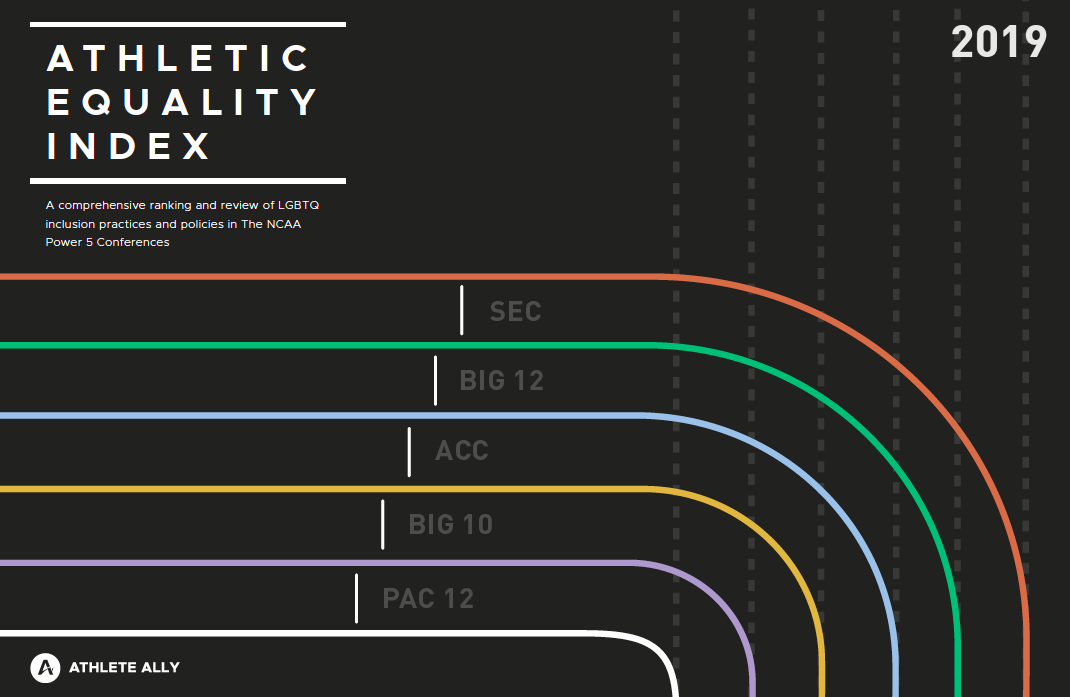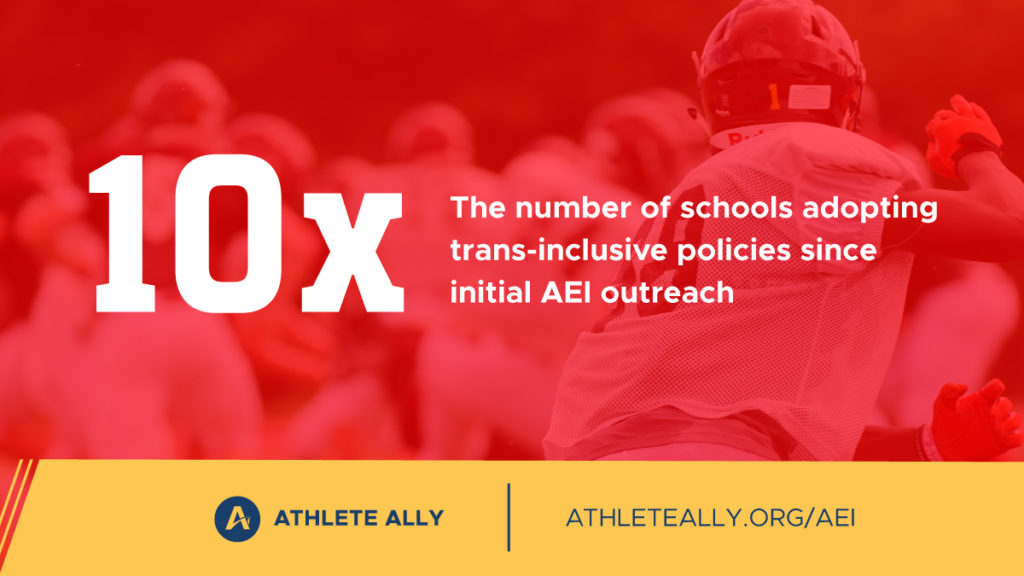Updated Athletic Equality Index Shows Tremendous Progress, Opportunities for LGBTQ Inclusivity

New York (December 10, 2019) – Today, Athlete Ally released the updated version of its historic 2017 Athletic Equality Index (AEI), a first-of-its-kind ranking and reporting of the LGBTQ inclusiveness of all 65 member institutions of the NCAA’s Power 5 conferences. New data provides a comprehensive look at how schools are best meeting, or failing to meet, the needs of LGBTQ student-athletes, fans, coaches, staff and administrators in 2019.
Research shows that LGBTQ athletes are twice as likely to drop out of sports as their heterosexual, cisgender peers, and that LGBTQ students are nine times less likely to have complaints of homophobia or transphobia addressed under the current Administration. Universities have a unique opportunity to provide LGBTQ student-athletes with a space in which they can thrive, and the AEI provides a blueprint for how best to achieve this.
As a result of the 2017 AEI, more than 25 schools adopted unique inclusion policies, and the number of schools with trans-inclusive athletic policies quadrupled. From the time of Athlete Ally’s initial AEI outreach to now, the number of schools with trans-inclusive policies has increased ten-fold. Particularly given the rising discrimination and public harassment faced by trans women in sports, this data is especially useful to trans athletes applying to schools.
“It’s hard for trans athletes to know in advance exactly what kind of experience they’ll have at their school, which can make the college selection process even more stressful,” said University of Montana’s June Eastwood, the first transgender NCAA Division I Cross Country runner. “Through the AEI, students can see if the schools they’re considering have the policies and resources in place to make them feel welcomed for who they are.”

The Pac-12 is again the conference with the highest average score (83.5) with Big 10 just .2 behind (83.3), and the SEC is the lowest with an average of 65.6. The number of schools with a perfect score has tripled, with Duke University, the University of Miami (ACC); Ohio State University, Indiana University at Bloomington, the University of Illinois at Urbana-Champaign (Big 10); the University of Texas at Austin (Big 12); the University of California, Berkeley and the University of Southern California (Pac 12) leading the way forward.
Athletes at schools with inclusive and supportive environments take their lessons of allyship with them when they graduate. Duke alum Imani Dorsey went on to become a professional soccer player with Sky Blue FC of the National Women’s Soccer League, and recently joined Athlete Ally as a Pro Ambassador.
“During my time at Duke, I learned what it truly means to be an ally, and how an inclusive environment can bring people together and make our community stronger,” Dorsey said. “As an ally and a Duke alum, I’m so proud to see my alma mater standing up for the LGBTQ community through comprehensive non-discrimination policies, on-campus resources, and an overall commitment to inclusion.”
The major change in this iteration of the AEI is the measure of cross-campus partnerships and of LGBTQ events. While in 2017 schools were awarded full points for making collaborations, such as Pride nights, possible between athletic departments and campus LGBTQ groups, this iteration looked at whether those collaborations actually occurred. This version also looks at LGBTQ events hosted within the past year, not just if an event had ever occurred.
Due to this change in scoring standards, some schools had scores decrease or stagnate. Yet there is hope in schools like University of Pittsburgh, which saw a 47 point increase from 48 in 2017 to 95 in 2019.
“The AEI paints a picture of the kind of environment LGBTQ student-athletes, fans, coaches, staff and administrators face in 2019,” said Hudson Taylor, Founder and Executive Director of Athlete Ally. “It’s our hope that through this data, we can showcase best practices, highlight areas of improvement, and work to make athletic spaces more welcoming and inclusive for all.”
Thanks in part to our partners, like Under Armour, for continuing to work to make athletic spaces more welcoming and inclusive for all. Download the full report here.
About Athlete Ally:
Athlete Ally believes sport will change the world when it welcomes and empowers all people. As a leading national nonprofit working at the intersection of sport and LGBTQ equality, Athlete Ally works to end the structural and systemic oppression that isolates, excludes and endangers LGBTQ people in sport. We educate individuals and institutions to understand obstacles to inclusion for LGBTQ people and how they can build an inclusive culture within their athletic communities. We work to ensure sport governing bodies, teams and leagues adopt policies that reflect the diversity of their constituents. We incubate athlete activism to advance LGBTQ equality in and through sport.
Press inquiries: Joanna Hoffman at joanna.hoffman@athleteally.org